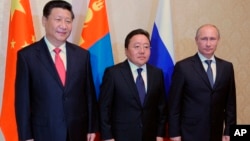As a Eurasian summit began in Tajikistan on Thursday, analysts say Moscow could use the multilateral meeting to bolster support.
Russia will take the reins of the Shanghai Cooperation Organization (SCO) for the next year at the two-day summit of China, Russia, and four Central Asian countries in Dushanbe.
The political, economic, and security forum comes as Moscow faces increasing isolation from Europe and the United States and western-imposed economic sanctions.
Aleksei Maslov, head of Center for Oriental Studies at National Research University Higher School of Economics, says Russia may use the next year at the head of the SCO to co-opt the organization’s agenda.
"There is no doubt that after Russia takes over the rotating SCO presidency after the summit, it will bring new leverage to Russia in influencing the international situation," said Maslov. "This is because Russia will determine the SCO’s meeting agenda in the coming year, and Russia will try to exercise influence on the SCO Secretariat in Beijing and the SCO anti-terrorism center. These are very important for Russia to leverage in exerting influence."
Russia may use the SCO to build support, but it will also have to balance China's influence within the organization.
Over the years, China has used the SCO to expand alliances in Central Asia, which is traditionally Russia’s sphere of influence.
Russian Foreign Minister Sergei Lavrov says Russia will make the SCO more active and strengthen ties between member-states, observer countries, and international organizations.
During the summit, leaders will finalize rules on how to expand the organization and accept new members. Yury Ushakov, an aide to Putin, says India and Pakistan will become SCO members next year - the first additions since the organization's establishment in 2001.
In recent years, Russia has lobbied for India's membership to balance China's sway on the other member-states - Kazakhstan, Kyrgyzstan, Tajikistan and Uzbekistan.
Maslov believes China will push Pakistan to become a new member in response. But he doesn’t think the expansion will be soon.
"Although SCO members are equal to each other on the surface, Central Asian countries are actually allying with China, because China provides [them] loans, training, and large-scale infrastructure," Maslov said.
However, due to the complex relations between China and India and longstanding issues between India and Pakistan, the function and influence of the SCO may also be diluted if the two countries join.
This report was produced in collaboration with the VOA Mandarin service.




